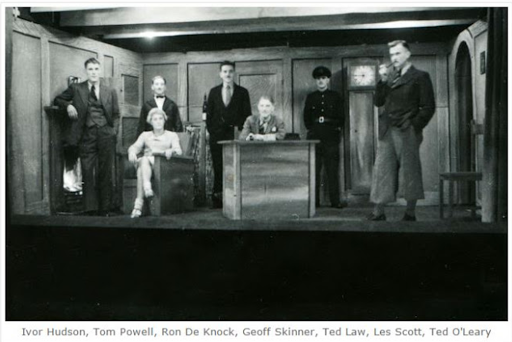Arbeitskommando (work camp in English) 10029/GW, in the Klagenfurt suburb of Waidmannsdorf, held about 250 army1 prisoners. The commandant and his guards were army soldiers, but men generally considered too old for active service. The camp was built and financed by a civilian contractor who used the prisoners as labourers2. Their work ranged from digging drains, construction, and unloading coal to shovelling snow. All Klagenfurt’s prisoners were 'other ranks,' i.e. Privates, Lance Corporals or Corporals3.
Each Arbeitskommando had a Vertrauensmann - a Man of Confidence - who was elected liaise between the POWs and the Camp Authorities4. In the larger camps such as Klagenfurt, the MOC was promoted to Sergeant by the POW hierarchy at Stalag 18A at Wolfsberg. At various times, the MOC had to be a leader, a diplomat, a mediator, a negotiator, an administrator, and a politician. The MOC, as the ranking NCO, also set the standards for military discipline and dress. This was a demanding role as he had no military authority apart from his rank and no peers to lean on. And not least because Klagenfurt was populated by soldiers from three different armies, British (about 40%), Australian (about 35%) and New Zealand (about 25%). This mix changed from time to time as POWs transitioned camps. An exception to the mix was South African Michael Cyster, a ship's galley boy from Cape Town.
Stuart Stubbings
The initial Klagenfurt MOC, an Australian, lost favour and an election was held to replace him. Another Australian, Corporal Stuart Stubbings, was elected and retained the position until the end of the war. Cpl Stubbings, born 12 Nov 19055, was one of the older men in the camp. He was also a capable soldier having been awarded a MID in the Desert Campaign.
 |
| Sgt Stubbings, second left (J Dowick collection) |
 |
| Sgt Subbings with an eagle rescued by one of the POWs, wearing his favourite slippers (Ian Nowell) |
Stubbings was somewhat of an enigma. He grew up in the tiny Tasmanian town of Sandfly (pop. 157 in 2011) with little in the way of formal education. He fell afoul of the law when still a teenager and served three months in prison for forgery and larceny. Ten years later he was charged with a similar crime, but the court found him not guilty. The men called Stubbings 'King' for his penchant for military pomp and ceremony6. Stuart died on Christmas Day, 1985.
Geoffrey Skinner
Lance Bombardier Skinner, Royal Artillery, was born 16 Dec 1919. An Englishman, he was born 16 Dec 1919. Geoff was the camp clerk, a Corporal O’Riley (MASH) if you like, and a man
who was an important support to the MOC. He was the keeper of records, crucial to the management and security of mail, Red Cross parcels and recreational equipment. In the camp he was a member of the theatre group and
participated in sports events.
 |
His selection for his role as
camp clerk was genius. Although equipped with only a basic education, Geoff was
intellectually gifted. While in the camp he had his family send him books so
that he could sit for matriculation exams as soon as he was released. This he
did. He passed his examinations and was accepted into medical school. He later became a pathologist in
London. Geoff died in London on 22 Mar 2010 aged 90.
Footnotes
1.
Soldiers, sailors, and airmen prisoners were incarcerated
by the respective service branch and were guarded by the German equivalent
branch.
2.
Under the Geneva Convention, these ranks could be
put to work whereas senior non-commissioned officers could not.
3.
Army corps sometimes had their own name for junior
ranks. For example, an ‘private soldier’ Armoured Corps was Trooper (or Lancer in
some regiments, Sapper in Engineers, Driver in the Service Corps, Craftsman in
Electrical and Mechanical Engineers, Gunner in Artillery, or Signaller in Signals.
The British still used the rank Farrier in one of their Corps. Corporals in
Artillery were called Bombardiers.
4.
The initial MOC at Klagenfurt was appointed by a
senior NCO at Stalag 18A.
5.
Stubbings’ birth date was provided by a family member.
His army records show he was born a year later.
6.
Jock Nowell's records.







No comments:
Post a Comment